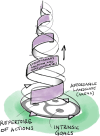Naturalizing relevance realization: why agency and cognition are fundamentally not computational
- PMID: 38984275
- PMCID: PMC11231436
- DOI: 10.3389/fpsyg.2024.1362658
Naturalizing relevance realization: why agency and cognition are fundamentally not computational
Abstract
The way organismic agents come to know the world, and the way algorithms solve problems, are fundamentally different. The most sensible course of action for an organism does not simply follow from logical rules of inference. Before it can even use such rules, the organism must tackle the problem of relevance. It must turn ill-defined problems into well-defined ones, turn semantics into syntax. This ability to realize relevance is present in all organisms, from bacteria to humans. It lies at the root of organismic agency, cognition, and consciousness, arising from the particular autopoietic, anticipatory, and adaptive organization of living beings. In this article, we show that the process of relevance realization is beyond formalization. It cannot be captured completely by algorithmic approaches. This implies that organismic agency (and hence cognition as well as consciousness) are at heart not computational in nature. Instead, we show how the process of relevance is realized by an adaptive and emergent triadic dialectic (a trialectic), which manifests as a metabolic and ecological-evolutionary co-constructive dynamic. This results in a meliorative process that enables an agent to continuously keep a grip on its arena, its reality. To be alive means to make sense of one's world. This kind of embodied ecological rationality is a fundamental aspect of life, and a key characteristic that sets it apart from non-living matter.
Keywords: adaptation; anticipation; autopoiesis; cognition; natural agency; open-ended evolution; radical emergence; relevance realization.
Copyright © 2024 Jaeger, Riedl, Djedovic, Vervaeke and Walsh.
Conflict of interest statement
The authors declare that the research was conducted in the absence of any commercial or financial relationships that could be construed as a potential conflict of interest.
Figures







References
-
- Andersen B. P., Miller M., Vervaeke J. (2022). Predictive processing and relevance realization: exploring convergent solutions to the frame problem. Phenom. Cogn. Sci. 10.1007/s11097-022-09850-6 - DOI
-
- Andrews M. (2021). The math is not the territory: navigating the free energy principle. Biol. Philos. 36:30. 10.1007/s10539-021-09807-0 - DOI
-
- Arthur W. B. (1994). Inductive reasoning and bounded rationality. Am. Econ. Rev. 84 406–411.
LinkOut - more resources
Full Text Sources

